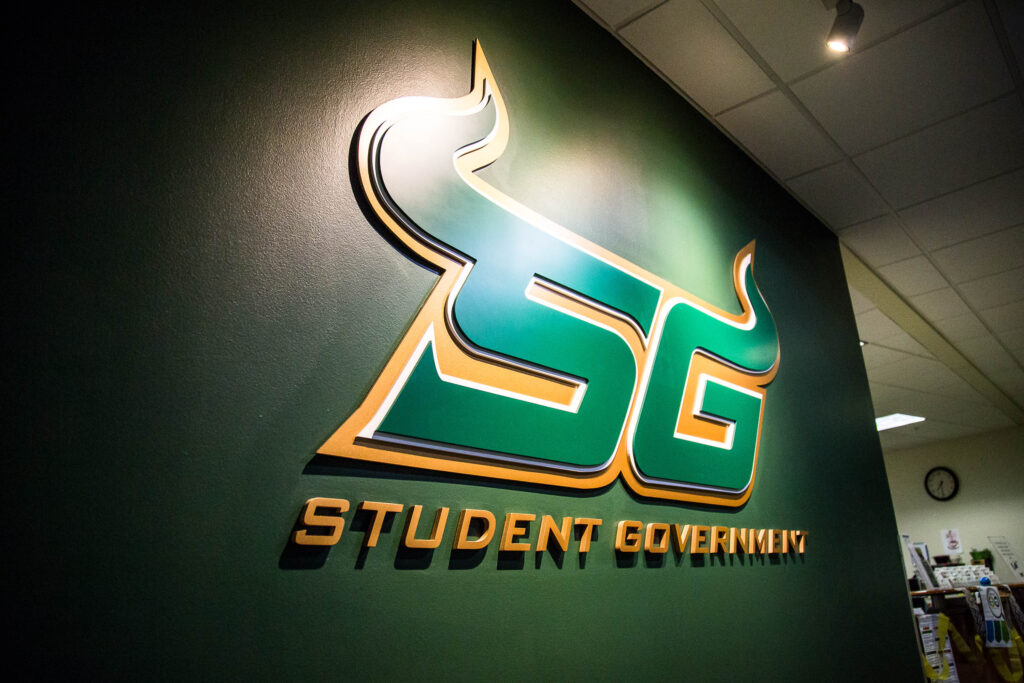SG to hire student advisers to aid in conduct process

A new set of staff will be added to Student Government (SG) as a part of its recently established program intended to advise students facing a student code of conduct investigation.
Students facing the student conduct process will be assisted by peers beginning fall 2021 through the SG Bulls Student Advisors (BSA). The program will consist of student advisers providing “nonlegal, nonadversarial” advising services to undergraduate and graduate students in all cases of student conduct processes except those involving sexual harassment, stalking and violence.
While the work will be conducted from the Tampa campus, the BSA’s services will be available to students universitywide. Services offered include one-on-one assistance on the student conduct process, support during the process, explanations on the rights students are offered and resolution options.
The SG Senate passed a bill to approve the creation of BSA on March 9. Student Body President Claire Mitchell then signed it into SG law March 15, according to Tampa Lt. Gov. Zach Blair-Andrews. BSA student advisers will be paid $8.75 per hour and work an average of five to eight hours a week.
There will be three employees, each with different roles in addition to advising students, hired for the program, including an assistant director, a director and a student staff member. Interested candidates should be on the lookout for applications posted to the USF Instagram and other social media platforms during the summer and beginning of fall.
The idea to implement the process of student peers being advisers at the USF Tampa campus was proposed in 2019 by Samuel Rechek, director of engagement for SG at the Tampa campus.
Rechek attended several conferences at other universities such as Michigan State University and Georgetown University, which gave him insight to the student conduct process and helped him bring this idea to USF. SG was motivated to begin this program by evaluating the success student advisers had at other universities.
“The first step for Zach and I was meeting with these other schools to learn about the structure of their programs,” Rechek said.
Gathering information was crucial in order to bring this idea to USF, Rechek said. He then proposed the idea to Blair-Andrews, and they started developing the concept.
“There is something about peer to peer that [creates] a better connection,” Blair-Andrews said. “You’d be more comfortable talking to your [resident assistant] rather than talking to [your] boss. So, that is something I think is going to be a great success with [the BSA program] that I am looking forward to.”
Blair-Andrews believes this change will make for a more positive campus and student body. The BSA will provide an educational benefit to the USF community through marketing campaigns and handouts, to remind students to stay safe and abide by the code of conduct, according to SG’s business plan for the program.
This marketing campaign will intensify the importance of abiding by the USF code of conduct, and can prevent students from ending up going through the student conduct process.
USF’s code of conduct outlines standards and policies students are required to follow while enrolled at the university. The student conduct process holds students accountable if they violate any of the code’s policies. The BSA program will be able to help students through the process with their comprehension of the conduct’s codes and proceedings.
Conduct Code Policy 6.0021 offers students a number of due process rights when they go through the student conduct process. One of the rights is to have an assistant adviser present who would provide support and assistance throughout the hearing process and trial, according to Rechek.
Student rights include having a student adviser present. Having a peer serve in the adviser position could make the process more comfortable for those who have been reported on. Comfort is important during this process because it can be a nerve-wracking time for a student, according to Blair-Andrews.
“We think that students working with students will provide that peer that is needed, you know that peer level of support can really provide comfort. This comfort level will really help during this unfamiliar time,” Rechek said.
The Student Conduct and Ethical Development (SCED) office, which is part of Student Success, develops the standard for behavior at USF and receives violations of the student code of conduct. SCED is going to collaborate with the BSA through frequent meetings to discuss university policy and updates to the student conduct process.
“We will be pursuing opportunities when this agency starts to form for how those services can be provided to students across USF,” Rechek said. “We are hoping to provide services to everyone at USF, despite this being a Tampa campus executive branch initiative.”
He said above all, he wants to make students aware that they have access to certain rights as they undergo the process.
“Students are afforded this right [to an adviser]. I believe that is one of the things SCED told us early on is that they get students entering into the student contract process and they do not know that they are afforded these rights,” Rechek said.






